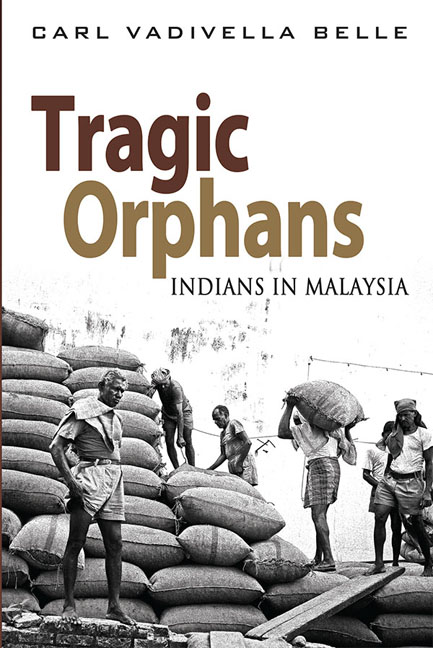Book contents
- Frontmatter
- Contents
- Acknowledgements
- List of Abbreviations
- Introduction
- 1 The Malay Peninsula: Early History, Melaka and the Colonial Setting
- 2 European Colonialism and the Malay Peninsula
- 3 India and the Development of British Ideologies of Empire
- 4 British Governance of Malaya
- 5 Slavery and Indentured Labour
- 6 Indian Indentured Labour in Malaya
- 7 Kangany Labour in Malaya
- 8 Other Indian Immigration
- 9 Indian Political Development to 1941
- 10 The Japanese Invasion, Subhas Chandra Bose and Indian Wartime Nationalism
- 11 The Post–war Period: Reform and Repression: 1945–48
- 12 From Federation to Merdeka
- 13 From Malaya to Malaysia: Singapore, 13 May and the New Economic Policy
- 14 The Mahathir Years: A Changing Malaysian Landscape
- 15 Abdullah Badawi, Islamization, and the Rise of Hindraf
- 16 Najib and 1Malaysia: A New Deal?
- Conclusions
- Bibliography
- Index
13 - From Malaya to Malaysia: Singapore, 13 May and the New Economic Policy
Published online by Cambridge University Press: 06 June 2017
- Frontmatter
- Contents
- Acknowledgements
- List of Abbreviations
- Introduction
- 1 The Malay Peninsula: Early History, Melaka and the Colonial Setting
- 2 European Colonialism and the Malay Peninsula
- 3 India and the Development of British Ideologies of Empire
- 4 British Governance of Malaya
- 5 Slavery and Indentured Labour
- 6 Indian Indentured Labour in Malaya
- 7 Kangany Labour in Malaya
- 8 Other Indian Immigration
- 9 Indian Political Development to 1941
- 10 The Japanese Invasion, Subhas Chandra Bose and Indian Wartime Nationalism
- 11 The Post–war Period: Reform and Repression: 1945–48
- 12 From Federation to Merdeka
- 13 From Malaya to Malaysia: Singapore, 13 May and the New Economic Policy
- 14 The Mahathir Years: A Changing Malaysian Landscape
- 15 Abdullah Badawi, Islamization, and the Rise of Hindraf
- 16 Najib and 1Malaysia: A New Deal?
- Conclusions
- Bibliography
- Index
Summary
In general the post-Merdeka Alliance government continued those economic and social policies that had been formulated prior to the attainment of Merdeka. While Malaya experienced steady economic expansion, industrialization was sluggish, and export earnings continued to be overreliant on the three staples of the colonial era — tin, rubber, and timber. Foreign economic domination continued and in 1970, 70.8 per cent of the nation's wealth remained in the hands of non-Malaysians.
During his years in office the Tunku adopted a policy of gradualism towards nation building. His efforts were directed towards developing a pluralistic society based on multiracial cooperation and goodwill out of which would naturally evolve loyalty to Malaya as a nation. While the Tunku advanced Malay symbols of nationhood — the King, the national language — he also encouraged the promotion of ethnic cultures and languages. The Tunku believed that the routine interactions of quotidian life, as well as national activities including sport, festivals, and cultural events would foster an identifiable and definitive Malayan nationalism.
Support for the Alliance declined significantly in the 1959 elections. The Alliance vote fell from 79.6 per cent of the electorate in 1955 to 51.5 percent in 1959. The PMIP's vote increased from 3.9 per cent to 21.2 per cent, while Chinese support drifted from the Alliance to opposition parties, so that the MCA won only 19 of the 31 seats it contested. The results hinted at growing ethnic polarization in Malaya.
THE FORMATION OF MALAYSIA
Schemes to form a Malaysian Federation, comprising Malaya, Singapore, and the British colonies of Sarawak, North Borneo (later known as Sabah), and the British Protectorate of Brunei, had been repeatedly mooted by the British authorities throughout the 1950s. For some years the Malayan government evinced little enthusiasm for the proposal. The Malayan leadership feared that such a union would infuse an unacceptably large number of Chinese voters into Malaya, thus destroying the delicate racial balance and threatening the precarious Malay control of the politics of the Peninsula. Moreover, the firmly anti-communist Alliance government viewed Singapore with its supposedly inherent left-wing politics and its non-communal policies as a potential source of political instability.
- Type
- Chapter
- Information
- Tragic OrphansIndians in Malaysia, pp. 299 - 330Publisher: ISEAS–Yusof Ishak InstitutePrint publication year: 2014

